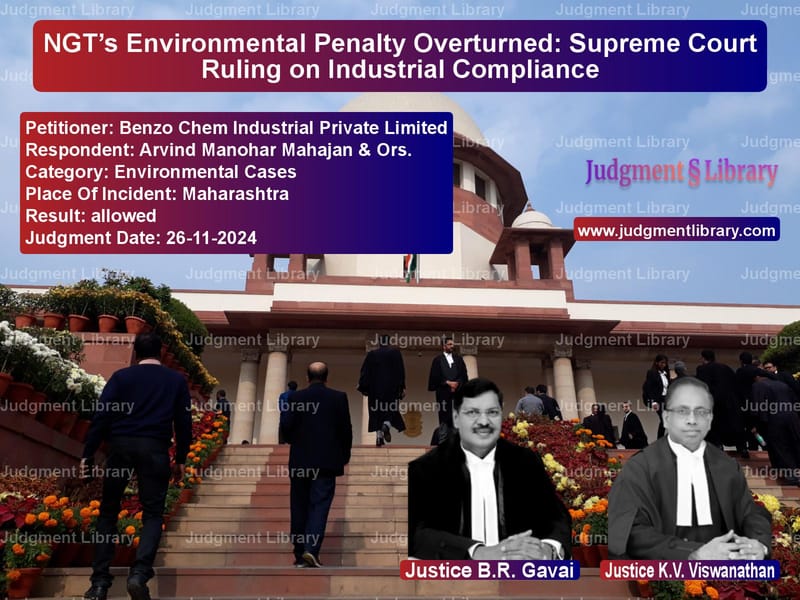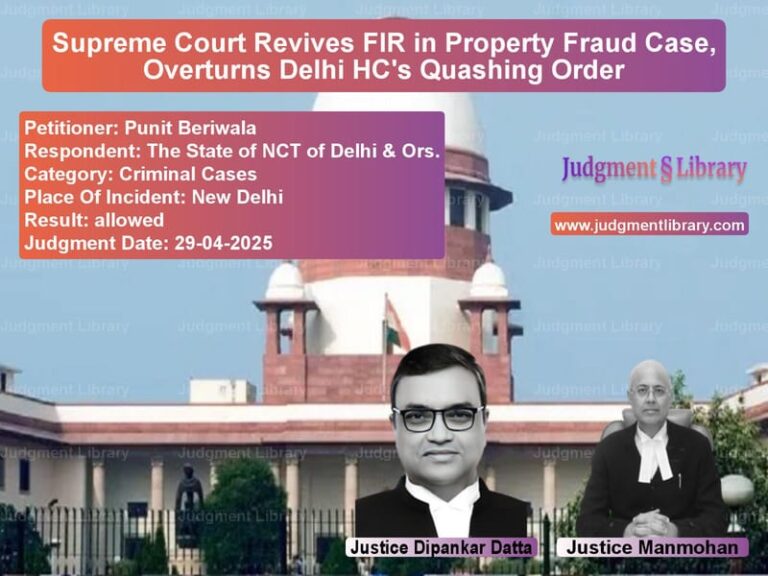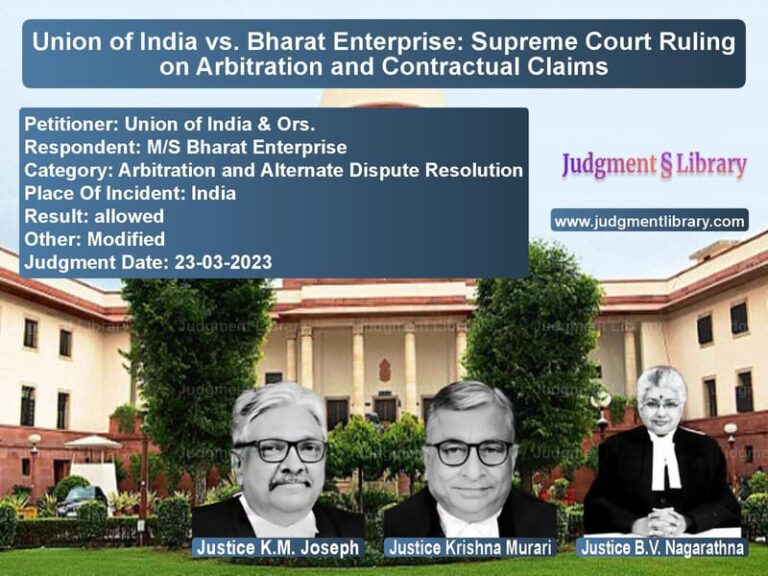NGT’s Environmental Penalty Overturned: Supreme Court Ruling on Industrial Compliance
In a recent judgment, the Supreme Court of India overturned a penalty imposed by the National Green Tribunal (NGT) on Benzo Chem Industrial Private Limited. The case centered around environmental compliance issues and whether the NGT had correctly assessed violations by the company. The Supreme Court found that the NGT’s decision lacked adherence to the principles of natural justice and imposed an arbitrary penalty without concrete evidence.
Background of the Case
The controversy began with two orders issued by the National Green Tribunal (NGT):
- August 29, 2022: The NGT imposed a penalty of Rs. 25 crores on Benzo Chem Industrial Private Limited, citing environmental non-compliance.
- November 22, 2022: The NGT rejected the company’s review application, upholding its previous decision.
The NGT based its findings on claims that the company had not complied with environmental regulations since 2010. However, the company challenged these findings, arguing that the reports from the Maharashtra Pollution Control Board (MPCB) and the National Environmental Engineering Research Institute (NEERI) indicated no such violations.
Arguments of the Parties
Arguments by the Appellant (Benzo Chem Industrial Pvt. Ltd.)
The company’s legal counsel, Shri A.N.S. Nadkarni, presented the following arguments:
- The NGT’s order showed a total non-application of mind and did not consider verified environmental reports.
- Both the MPCB and NEERI had inspected the company’s facilities and found no violations. However, the NGT recorded findings that were contrary to these reports.
- The penalty of Rs. 25 crores was arbitrarily imposed without any standard methodology.
- The penalty was based on an assumption that the company’s annual revenue ranged between Rs. 100 crores to Rs. 500 crores, without verifying actual financial statements.
- The company was denied a proper hearing, violating the principles of natural justice.
Arguments by the Respondents (Maharashtra Pollution Control Board & Environmental Activists)
The respondents, represented by Shri Feroze Ahmad and Shri Mukesh Verma, argued:
- The NGT had examined multiple reports and concluded that the company had been violating environmental laws for over a decade.
- The NGT has the authority to impose environmental penalties based on public interest and past violations.
- The company had previously filed an undertaking in 2020, admitting to remedial measures, which proved its earlier non-compliance.
- The environmental damage caused by the company justified a severe penalty.
Supreme Court’s Observations and Judgment
The Supreme Court, after reviewing the case, identified major flaws in the NGT’s decision:
- The NGT incorrectly claimed that the company had been non-compliant since 2010, despite multiple reports from MPCB and NEERI confirming compliance.
- The penalty of Rs. 25 crores was imposed without any legal basis. The Court observed, “The methodology adopted by the learned NGT for imposing penalty is totally unknown to the principles of law.”
- The NGT’s reliance on the company’s estimated revenue range of Rs. 100 crores to Rs. 500 crores was flawed. The Court noted that if the NGT had relied on public information, it should have determined an exact figure rather than assuming a broad range.
- The lack of a formal notice before imposing such a heavy penalty violated natural justice.
The Supreme Court ultimately ruled:
“We are, therefore, inclined to quash and set aside the impugned judgments and orders and allow these appeals. Ordered accordingly.”
Impact of the Judgment
The Supreme Court’s ruling has significant implications for environmental law and regulatory bodies:
- It reiterates the importance of due process and adherence to legal principles when imposing environmental penalties.
- Regulatory bodies like the NGT must base their decisions on verified reports and factual findings, rather than assumptions.
- Industries accused of environmental violations must be given a fair opportunity to present their case.
- The judgment serves as a precedent for future cases where arbitrary penalties are imposed without legal justification.
Conclusion
This judgment underscores the necessity of fair legal procedures in environmental compliance cases. While industrial regulations are crucial, penalties must be based on concrete evidence and follow established legal principles. The Supreme Court’s intervention ensures that businesses are not unfairly targeted and that environmental governance remains within the framework of the law.
Petitioner Name: Benzo Chem Industrial Private Limited.Respondent Name: Arvind Manohar Mahajan & Ors..Judgment By: Justice B.R. Gavai, Justice K.V. Viswanathan.Place Of Incident: Maharashtra.Judgment Date: 26-11-2024.
Don’t miss out on the full details! Download the complete judgment in PDF format below and gain valuable insights instantly!
Download Judgment: benzo-chem-industria-vs-arvind-manohar-mahaj-supreme-court-of-india-judgment-dated-26-11-2024.pdf
Directly Download Judgment: Directly download this Judgment
See all petitions in Environmental Cases
See all petitions in Legal Malpractice
See all petitions in Contempt Of Court cases
See all petitions in Judgment by B R Gavai
See all petitions in Judgment by K.V. Viswanathan
See all petitions in allowed
See all petitions in supreme court of India judgments November 2024
See all petitions in 2024 judgments
See all posts in Environmental Cases Category
See all allowed petitions in Environmental Cases Category
See all Dismissed petitions in Environmental Cases Category
See all partially allowed petitions in Environmental Cases Category







